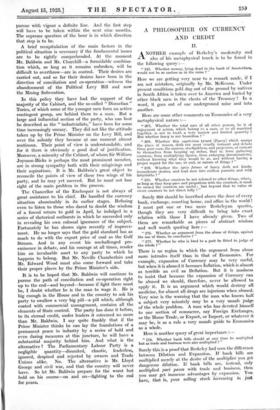A PHILOSOPHER ON CURRENCY AND CREDIT II.
ANOTHER example of Berkeley's modernity and also of his metaphysical touch is to be found in the following query :-- " 242. Whether money, lying dead in the bank of Amsterchun, would not be as useless as in the mine ? "
Here we are getting very near to a remark made, if I am not mistaken, originally by Mr. McKenna. Under present conditions gold dug out of the ground by natives in South Africa is taken over to America and buried by other black men in the chests of the Treasury ! In a word, it goes out of one underground mine and into another. • Here are some other comments on Economics of a very metaphysical nature :-
" 307. Whether the total sum of all other powers, be it of enjoyment or action, which belong to a man, or to all mankind together, is not in truth a Very narrow and limited quantity ? But whether fancy is not boundless ? "
" 308. Whether this capricious tyrant [Fancy] which usurps the place of reason, doth not most cruelly torment and delude those poor men, the usurers, stockjobbers, and projectors, of content to themselves from heaping up. riches, that is, from gathering counters, from multiplying figures, from enlarging denominations, without knowing what they would be at, and without having a proper regard for the use, or end, or nature of things ? "
" 309. Whether the igais fatutsa of fancy doth not kindle immoderate desires, and lead men into endless pursuits and wild labyrinths ? "
" 310. Whether counters be not referred to other things, so long as they keep pace and proportion with the counters, it must be owned the counters are useful ; but beyond that to value or covet counters be not direct folly ? "
Surely 308 should be inscribed above the door of every bank, exchange, counting house, and office in the world ! I must put one or two more Berkeleyan queries, though they are very difficult to bring into exact relation with those I have already given. Two of them are remarkable as pieces of abstract wisdom and well worth quoting here :—
" 276. Whether an argument from the abuse of things, against the use of them, be conclusive ? "
" 277. Whether he who is bred to a part be fitted to judge of the whole ? "
There is no region in which the argument from abuse more intrudes itself than in that of Economics. For example, expansion of Currency may be very useful, but when it is abused it becomes Inflation, which is almost as terrible an evil as Deflation. But it is madness to insist that because the expansion of Currency can be abused we should, therefore, never be allowed to apply it. It is an argument which would destroy all medicine, for almost all drugs are injurious when abused. Very wise is the warning that the man who knows half a subject very minutely may be a very unsafe judge of the whole problem. A man who has devoted himself to one section of commerce, say Foreign Exchanges, or the Home Trade, or Export, or Import, or whatever it may be, is as a rule a very unsafe guide to Economics as a whole.
Here is another query of great importance :-- " 124. Whether bank bills should at any Limo be multiplied
but as trade and business were also multiplied ? "
Surely this is a proof that Berkeley had seen the difference between Dilution and Expaniion. If bank bills are multiplied merely at the desire of the multiplier you get dangerous dilution. If bank bills arc, instead, only multiplied pari passu with trade and business, then you may get immense advantages by expansion. You have, that is, your rolling stock increasing in jUst proportion with your produce, and so can bring tha produce where it is wanted.
The next query to this is a very interesting one and has an extraordinarily modern ring :- " 125. Whether it was not madness in France to mint bills and actions, merely to humour the people and rob them of their cash ? "
Here is one more metaphysical query which is well worth the attention of thoughtful men, though let me confess at once that it is not a matter on which I dare to dogmatize :— " 58. Whether some men will not be apt to argue as if the question was between money and credit, and not (as in fact it is) which ought to be preferred, private credit or public credit."
I shall leave my quotations from the Querist with one more query, which, I may note, is to be found as a motto to Mr. Baxendale's recent book, The Coming Crash (Cecil Palmer, 5s. net) :— " 424. Whether money circulating be not the life of industry ; and whether the want thereof doth not render a State gouty and inactive ? "
Alas ! That we are gouty and inactive at the present moment can hardly be doubted. Also, it seems to me as little doubtful that our policy at the present time is, consciously or unconsciously, to prevent money circu- lating, and so to devitalize trade !
As a final apology for my temerity I will quote the following query :— " 315. Whether one, whose end is to make his countrymen think, may not gain his end, even though they should not think as he doth ? "
J. ST. LOE STRACHEY.







































 Previous page
Previous page